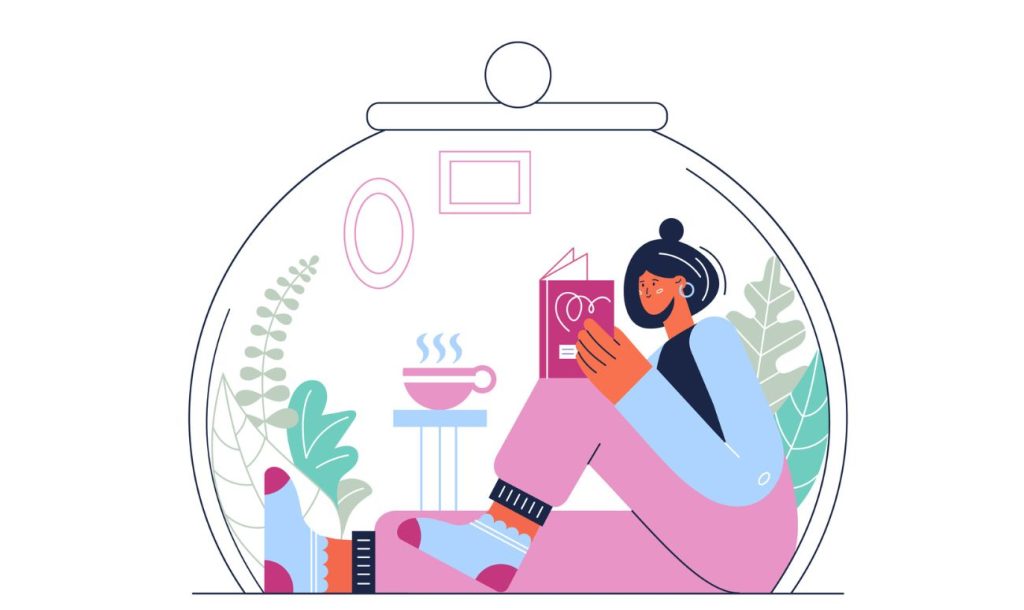Life can be overwhelming with the pace it moves forward. Sometimes it can be exciting but other times it can feel stressful. And that stress can trigger some powerful emotions like anger, anxiety, fear, loneliness, and more. For introverts, this stress can become very overwhelming and disorienting as they often process and feel things deeply as compared to their extrovert counterparts. However, this anxiety is not permanent, it can be controlled with one key solution: mindfulness. You can easily manage stress as an introvert with mindfulness. Practicing mindfulness regularly can invoke calm and decrease feelings of stress and overwhelm.
So, here are six ways introverts can acknowledge, understand and transform stress and anxiety into mindfulness.
6 Ways To Manage Stress As An Introvert
1. Practice Meditation
Meditation is one of the most powerful tools to boost your resilience toward stress. Practicing it consistently long-term can improve mental health and inculcate a sense of calm within. This doesn’t mean you’re always calm when faced with adversity but instead, you build a quiet place inside of you that helps you stay centred when thrown off by stress.
2. Journal

Having a healthy outlet for stress is very important and journaling can be an exercise that helps introverts. Writing is a great way to process emotions and train the mind to focus on the positive. Journaling can be done in multiple ways; as an emotional-processing journal, a gratitude journal, an anger journal, a positivity journal, or just a mind dump to let go of intrusive thoughts.
3. Prioritise Self-Care
Introverts are often drained quickly, by socialising, work stress, and personal life, needing more time to refill their energy battery. They are also prone to internalising a lot of things instead of expressing themselves to release tension and stress. This can feel extremely exhausting. By incorporating self-care into your day-to-day routine, you can take your time to relax after a stimulating day. A few things that you can try are:
- A bath or shower
- Listening to music on earphones while you do chores
- Walking your pet/Taking a walk by yourself
- Reading a book to quiet the mind
- Sleep meditation
4. Reflect On Your Thoughts
One thing about introverts is that they’re often lost in their minds. Sometimes it can be a good place and sometimes a bad place. One of the good places our mind goes to is daydreams. As explained by Swiss psychologist Carl Jung, “When you observe the world, you see people; you see houses; you see the sky; you see tangible objects. But when you observe yourself within, you see moving images, a world of images generally known as fantasies.” In our musings, we let our guard down and drift into a world where worrying about ourselves doesn’t exist. In doing so, we gain perspective on issues that are dogging us and reflect on our lives that leads to ultimately relaxing.
5. Declutter Your Life
Introverts have an affinity for having a space that’s their own, a place where they can go and recharge. If this space is chaotic, it becomes very difficult for them to function. While you may not be a fan of cleaning or find it particularly therapeutic, creating a “happy space” for you to retrieve can be great for stress management as it will boost your mood and give you a purpose.

6. Remember Your Strengths
Many introverts feel guilty for being the way they are, beating themselves up for not being extroverted or outgoing enough like their friends. And in an attempt to be more friendly and social, introverts can push beyond their limits. This is not necessarily a bad thing, in fact, studies have shown that when introverts act extroverted, they experience higher feelings of happiness. However, it’s okay to find balance and know your limits. You don’t need to change yourself to become someone you’re not. Honour your strengths and be compassionate with yourself.
The Good News
The key point to building a repertoire of self-care activities is to deeply enjoy your own company. And for introverts, this is especially important. Introversion in itself has several benefits, so in focusing your strengths instead of your weaknesses, and balancing things out with stress management tips, you can build a happy life that you’re content and comfortable with.
Read More: 10 Best Rejuvenating Skincare Products For At-Home Spa
Like & Follow ThinkRight.me on Facebook, Instagram, Twitter, Pinterest and Telegram to stay connected.






























